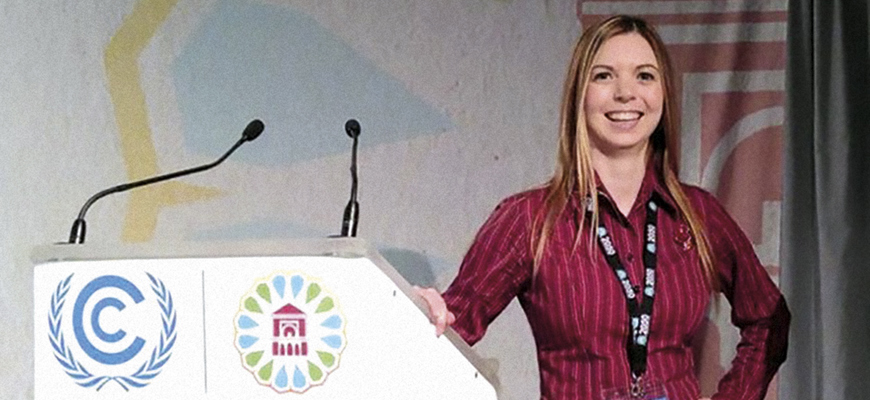In-house: Lawyer with natural energy

You are currently the sole UK in-house legal counsel at ERG. Can you tell us a bit about ERG and what your role involves on a day-to-day basis?
ERG is a European renewable energy company with such an interesting heritage, which I’m really proud to be part of. Today, ERG is one of Europe’s top wind and solar energy companies – very different from when it was formed 80 years ago as an Italian oil company. For me, ERG’s bold transformation from oil into renewable energy is an excellent example of the energy transition needed to fight climate change and achieve net zero.
As for my role, the only constant is that no two days are ever the same. The role brings a huge variety, which keeps it interesting and exciting. One day, I might be in an all-day negotiation, finalising the share purchase agreement for a new M&A deal; the next, negotiating an option for lease agreement with a farmer landowner for a new wind farm development; and the next, enjoying a sunny site visit at one of our wind farm construction sites, watching the cranes lift the blades onto our wind turbines.
Although I’m the sole UK in-house counsel, I’m fortunate to be part of a bigger international in-house legal team, with legal colleagues across Italy and France. We regularly hold internal meetings to share our experiences and exchange expertise across our different countries. Although our laws are different, we often experience the same legal and commercial issues, so we can act as each other’s sounding boards. I also have the support of our excellent external law firms who advise us on our outsourced legal work.
Tell us about your career path. What prompted you to work in-house and in the renewables sector?
After enjoying a varied traineeship with a full-service commercial law firm, I worked in private practice as a commercial property lawyer for six happy years before it was time for a new challenge. Having experienced in-house life through a couple of secondments, my sights were firmly set. As a climate enthusiast at heart, the renewable energy sector and ERG were a natural fit for me – it makes me feel proud to work in a sector which is helping to fight climate change and achieve net zero.
What has been the biggest reward of moving in-house?
Variety is the spice of life, and, for me, it is the variety of my work which makes the role so fulfilling – from commercial contracts to construction, from planning to procurement, and from health and safety to human resources. I also enjoy experiencing multiple legal systems – my work covers all three UK jurisdictions (Scotland, England & Wales and Northern Ireland), and I’m learning about European laws too. It is also very rewarding being part of an international company – it gives me the opportunity to experience doing business with other countries and cultures, as well as free language classes to help me learn Italian.
Are there any pieces of legal work at ERG that you’re particularly proud of?
I’m particularly proud of our community benefit agreements, which share the financial benefits of our renewable energy projects with the local communities where they are located. The renewables sector has a long history of supporting local communities, and our projects are proudly continuing that tradition.
For example, our Scottish wind farms in Sutherland and Dumfries & Galloway will donate around £1 million annually to their local communities – this includes recent donations of over £50,000 to local schools, which helped them buy educational technology during the COVID-19 pandemic.
You are also a director of ERG’s UK holding company and its UK subsidiaries. Do you think lawyers are well placed to hold company directorships?
An increasing number of organisations – across all sectors and industries – are appointing lawyers to their boards of directors, and I think lawyers are well placed to take on these roles. Lawyers are naturals when it comes to analysing and managing risk, and we are already well versed in directors’ duties and the Companies Acts.
In-house lawyers, in particular, often benefit from a “bird’s-eye view” of our organisations – gaining key insights across multiple departments – and can therefore bring a well-rounded and holistic perspective into the decision-making process.
Personally, I’ve found that joining the board of a charity as a trustee is a great way to build the relevant skills. Charities are often looking for legal trustees, and it can be a really fulfilling way for lawyers to give back to the community. Before joining ERG, I spent three years on the board of a local climate charity, which gave me invaluable hands-on experience, as well as being great fun.
As a climate enthusiast, you must be excited about COP26?
For sure! COP26 is the biggest international summit that the UK has ever hosted, and a great opportunity to showcase ourselves on the global stage. As the host country, the UK gets to set the tone for the whole climate conference. Scotland can boast the toughest statutory targets anywhere in the world (a 75% reduction in emissions by 2030, 90% by 2040 and net zero by 2045); and Glasgow can present its plans to become the UK’s first carbon neutral city by 2030. Given that the word “Glasgow” translates as “Dear Green Place”, it certainly makes it a fitting host city for COP26.
You have attended COP events in the past. What did you learn from these experiences and why is COP so important to you?
I feel very fortunate to have attended two previous COPs: COP22 in Morocco and COP23 in Germany. These opportunities came about while I was volunteering with local climate charity, 2050 Climate Group.
If I’m being completely honest, before I went to COP I didn’t feel all that optimistic about our climate future – the climate crisis seemed far too big and far too difficult a problem to solve. But at COP I experienced the whole world coming together, to help solve the climate crisis together. And that gave me real cause for optimism.
COP26 is particularly important because it is the most significant climate event since the Paris Agreement was adopted, and is being described as humanity’s “last chance” – both politically and scientifically – to do something meaningful about climate change.
How can we all get involved with COP26?
First of all, you can save the date! COP26 is scheduled between 31 October and 12 November 2021.
I also encourage you to register to attend COP26’s Green Zone if you can (restrictions permitting). The Green Zone is COP’s publicly accessible space, offering a platform for the public, youth groups, civil society, artists, academia and business to have their voices heard and showcase their activities.
Within the Green Zone, you can expect to be dazzled by events, exhibitions and talks, as well as art, music and dancing. A typical day in the Green Zone might start by arriving on a hydrogen-powered bus, drinking a smoothie blended by a bike’s pedal-power, sitting in the driver’s seat of the latest electric sports car, scaling an offshore wind farm through virtual reality, enjoying climate art exhibitions, and experiencing different world cultures – all while keeping your eyes peeled for VIPs and celebrities (expect to see the likes of Greta Thunberg, Arnold Schwarzenegger and the Queen, among many more).
Lastly, you can look out for the huge programme of unofficial events taking place all across the UK. There is expected to be a wide range – both virtual and in-person – including everything from climate conferences, awards dinners and networking events, to art, music and food festivals. At ERG, we’re looking forward to organising our own exciting side events in honour of COP26.
Do you think it is important for each of us to keep environmental factors in mind when doing our legal jobs?
Absolutely. “ESG” (environmental, social and governance) is a real hot topic at the moment, and is of growing importance to companies, investors and stakeholders.
At ERG, for example, our new 2021-2025 business plan puts ESG right at its core. We’ve adopted four ESG “pillars” which are integrated into our business model – (1) Planet: the fight against climate change; (2) Engagement: commitments in favour of local communities; (3) People: personal growth and wellbeing; and (4) Governance: principles and management inspired by best practice.
For “Planet”, we’ve set a carbon neutrality target of 2025 for scope 1 (direct emissions) and scope 2 (owned indirect emissions). For “Engagement”, we’ve committed to contributing at least 1% of revenues to communities and to education and training for future generations. For “People”, we’re implementing diversity and inclusion initiatives to create an ever more inclusive business; and for “Governance”, we’ve linked the short and long-term remuneration of our management to the achievement of our ESG objectives.
As lawyers, I think we have a huge opportunity to influence the ESG agenda. We are already advising our clients on ESG-related laws (even if we don’t realise it), and therefore already have a seat at the ESG table. For example, the “E” includes our advice to our clients on the Climate Acts and other environmental legislation. The “S” includes ensuring that our clients’ counterparties are contractually bound by similar values, such as eliminating modern slavery and championing health and safety. And the “G” includes keeping our clients safe from bribery, conflicts of interest and poor governance practices.
We can help to focus our clients’ minds on ESG even further, as well as adding value by sharing the best practices we see emerging amongst our clients’ peers.
Regulars
Perspectives
Features
Briefings
- Criminal court: ID from CCTV
- Criminal court: Justiciary Office briefing
- Licensing: Passport to confusion
- Planning: COVID and NPFD update
- Insolvency: Winding up easier, but hurdles remain
- Tax: Government continues to bring in new taxes
- Immigration: Asylum from the Taliban?
- OPG: Update
- Property: Common parts – a welcome clarification
- In-house: Lawyer with natural energy






